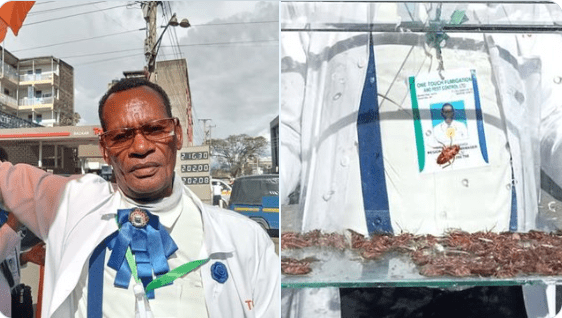In the bustling afternoon activity of Nakuru’s streets, a noticeable air of curiosity gripped bystanders, drawing them towards a sizable gathering eager to witness an unusual spectacle.
Among the intrigued onlookers was Stephen Mwangi, armed not with traditional marketing tools but with containers filled with live cockroaches and bedbugs.
This wasn’t a scene plucked from a horror movie; rather, it was Mwangi’s avant-garde approach to promoting a new insecticide named ‘One Touch.’
The unconventional marketing strategy unfolded as Mwangi organized live demonstrations right outside the Rift Fries restaurant, adding an unusual dimension to the local streetscape.
The gathered crowd stared in a mix of bewilderment and fascination as they observed insects crawling within glass containers next to bottles of the acclaimed pesticide.
In an exclusive interview with Mtaa Wangu, Mwangi shed light on the origin of this attention-grabbing tactic.
Drawing from his extensive sales experience, Mwangi recognized the need for an unconventional approach when introducing ‘One Touch’ to the Nakuru market.
“Having been in sales for a significant period, I realized the necessity for an approach that would truly captivate the audience when introducing the insecticide to the Nakuru market,” he shared.
As a Regional Sales Manager, Mwangi revealed that this unconventional strategy had been set in motion almost two years earlier.
Given Nakuru’s status as a burgeoning market, a bold initiative was essential to capture attention and drive sales.
Live demonstrations, showcasing the very pests that ‘One Touch’ aimed to eliminate, emerged as the perfect strategy.
When asked about the source of the roaches and bedbugs featured in his demonstrations, Mwangi explained, “We’ve enlisted a group of individuals to procure them for us. Since our offices are located in Nairobi, we currently source them from there, and the insects are sent to Nakuru via parcel.”
Interestingly, Mwangi disclosed the acquisition cost of these unsettling creatures at Sh5 per insect.
Claiming to have started with 200 cockroaches, Mwangi asserted that his daily collection has expanded to include up to 1000 cockroaches.
He clarified that the insects are transported to Nakuru in sacks to prevent suffocation during transit.
Despite the eccentricity of his marketing approach, Mwangi’s strategy seems to be gaining momentum.
As Mwangi interacts with customers at his stall, promoting both the concept and the product, he remains open to the unique business of acquiring roaches from anyone willing to part with them.
It’s an unconventional venture, but in the ever-evolving realm of marketing, Mwangi’s insect-infused innovation might just be the attention-grabber Nakuru desires.



